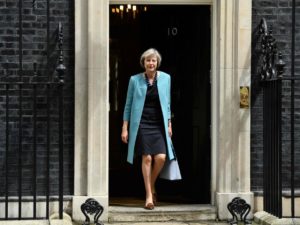Special to WorldTribune.com
 By Donald Kirk
By Donald Kirk
LONDON ― Nobody does politics like the Brits.
Just as Hillary and the Trumpster were turning into bores in the U.S., along came an unpredictable change in the leadership of the United Kingdom. While one conservative takes over from another as prime minister, confusion reigns.
For the benefit of anyone thinking Japanese or Korean or Taiwanese political struggles are nasty, what could have been nastier than the quick dash for power that grabbed headlines here after a majority of Brits voted for Britain’s exit from the European Union? If the outcome of the Brexit vote came as a shock, the aftermath of dirty politics was a second act mingling still more surprise with moments of comic relief and silliness.

The world’s conflict-ridden democracies should take note of the really good news: the power shift happened mercifully quickly with the ascent of the home secretary, Theresa May, to prime minister.
After May won an overwhelming majority of her party’s members in parliament, David Cameron decided to resign right away. Why put the country through months of time-wasting “transition,” as he had originally planned, before bowing out after the humiliation of the Brexit vote?
May’s sudden rise came after the nation was treated to the goofiness of another woman, her last major opponent, known for her extreme rightist views. Her mistake was to say that “being a mum means you have a very real stake in the future of our country, a tangible stake.”
That jab at May, who has no children, totally backfired. The woman, whose resume was suspect anyway, had to apologize and bow out to catcalls from all sides.
No British political ruckus would be complete without a sex scandal. In this political season, another member of Cameron’s cabinet with prime ministerial visions was revealed to have sent sexually suggestive messages to a young woman. The papers had a field day quoting one message in which he said he wanted to kiss her “everywhere.” Cameron said whatever the man had sexted was “private,” but he was finished.
Amid all the fun, issues were sublimated if not lost. For one thing, nobody really knows what Brexit is all about. Cameron, and now May, are trying to assure everyone that a lot of the deals made as a member of the European Union will go on, Brexit or not.
There’s even speculation Brexit won’t happen. Voices are heard saying the referendum was “non-binding.” Negotiations on the breakup have yet to begin. They may go on for a long time. May herself was for staying in the EU ― not loudly but enough to delay an “inevitable” breakup that may not be inevitable after all.
But what’s really interesting is there’s no serious political counter to the conservatives. The opposition Labour Party remains a weak and divided force. The Labour leader, Jeremy Corbyn, faces revolt led, yes, by a woman, Angela Eagle. Corbyn represents the far left of a party that’s almost centrist. There’s scarcely any chance of the Labour Party leader winning a majority of seats in parliament in a general election.
In any case, Labour leaders, ostensibly opposed to Brexit, seem uncertain about it considering how many party members, fearful of losing their jobs, oppose staying in Europe. In the combustible admixture of British politics, pro-Brexiters in Labour share a common cause with the patriotic rightists who are loudest in their horror over the EU.
U.S. leaders, and their friends in power in Seoul, Tokyo and elsewhere, should breathe sighs of relief over May’s rise. She’s dedicated to fighting terrorism along with Russian expansionism and definitely not going to advocate compromise with Kim Jong-Un.
Corbyn, in contrast, is ritualistically anti-American. An outfit called “Stop the War Coalition,” which Corbyn once led, believes “the interference, aggression of the U.S. and its allies” is responsible for tensions on the Korean Peninsula. What else but “the criminal U.S. embargo” and the presence of nearly 30,000 U.S. troops could create such havoc?
May, however, faces military issues closer to home. What’s to happen to the North Atlantic Treaty Organization (NATO), while EU members, still including Britain, quarrel among themselves? What commitment can Britain make to standing firm against the Russians while under pressure from the U.S. to fight against the Islamic State of Iraq and Levant (ISIL) in the Middle East?
For a day or two after Brexit, the fight over leadership of the Conservative Party ― and the nation ― was interrupted by the release of a sensational 12-volume report on a seven-year investigation, led by Sir John Chilcot, of the British military role in Iraq in 2003 and 2004. The Chilcot report castigated the decision of Tony Blair, prime minister at the time, to side with George W. Bush, then the U.S. president, in his decision to invade Iraq and overthrow Saddam Hussein on the grounds that Saddam had a nuclear weapons program.
The report was so scathing that it’s unlikely any British prime minister, even the conservative, resolute Theresa May, will want to make a similar commitment while worrying about Brexit, right or wrong, real or imagined.
Donald Kirk, a frequent visitor to London, has been covering war and peace in the Middle East for decades. He’s at kirkdon4343@gmail.com.
